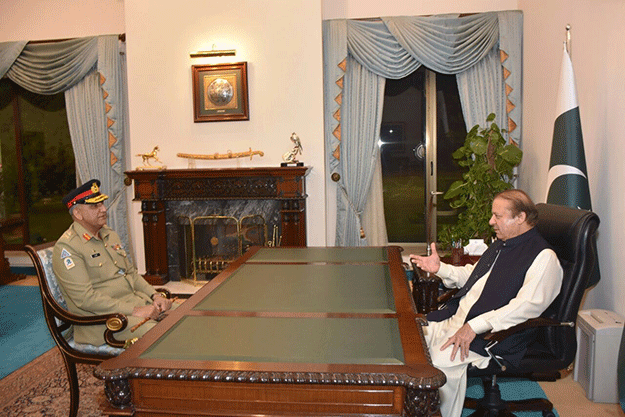The New Pakistan Army Chief: Challenges and Expectations

NEW DELHI: After considerable speculation, it has been announced in Pakistan that the next chief of the army will be Lt General Qamar Javed Bajwa. He will take over from the incumbent Gen. Raheel Sharif in a couple of days.
This represents an orderly transition: the new man was among the small clutch of possible successors, and his elevation does not affect the established hierarchical processes. The outgoing Chief had made it known in good time that he would not seek any extension of his term, and he has stuck to his rule-bound decision. Even so, almost until the last moment it was believed that efforts continued to persuade him to relent and grant himself a further term at the top.
Apart from the obvious impropriety of such a step, Gen. Raheel might have been mindful of the fact that extensions of this nature, even of the all-powerful figure at the head of the army, had seldom worked out well for the individual concerned. There was an unavoidable draining of authority and a subtle shift in the balance between military and civilian once the Chief elected to stay on, so from that point of view, and to emphasize the unassailable ascendancy of the army, the outgoing Chief was well advised to agree to leave as he did.
Speculation now shifts to the likely changes that Gen. Bajwa may bring about. Not very much is known about him; the few snippets of available information give a picture of a professional soldier who has risen steadily up the ladder, undertaking field and command assignments in regular succession as would be normal for someone of his seniority. His postings in POK and the Northern Areas have drawn attention in the media and show his familiarity with those places, though in this he may not be very different from other senior generals of the Pak army.
In the most recent phase of his career when he commanded an army corps he would have been part of the topmost group of senior generals that controls and monitors strategic decisions affecting both army and civilian rule. He thus brings experience and familiarity with the way things are done to his new post, and at first view would seem to represent continuity more than change.
One snippet about what people have to say about his personality suggests that Gen. Bajwa can be regarded as a moderate. This may mean not much more than that he is not to be identified with the religious hardliners who have made inroads into the Pakistan army. His stand on matters of religion in public life will no doubt come under scrutiny over time and he may to face fundamentalist pressures, for such groups are very active in Pakistan.
Beyond the military structure, where he is now supreme, the new Chief will need to develop a suitable relationship with the civilian government headed by Prime Minister Nawaz Sharif. In keeping with the proper form in such matters, Gen. Bajwa’s appointment was announced by PM Sharif, though the balance of authority between them will only become apparent in course of time. What can be said at this stage is that the transition has been smoothly managed, which can be a useful beginning.
In these circumstances, Gen. Bajwa’s elevation seems to suggest that continuity is the watchword rather than change, but this brings several problems of its own. This is a time of intense difficulty between India and Pakistan, the LOC is a place of repeated incidents, angry verbal exchanges have added to the discord, and military forces are at hand to back up political differences. There is need for sobriety and restraint on both sides even while public opinion is becoming daily more agitated.
The new Pakistan Army Chief will thus be plunged into a testing situation from the start. A recent effort to cool down the situation was witnessed in the meeting of the two DGMOs, apparently at Pak initiative, so communication between the two sides has not been foreclosed. How Gen. Bajwa responds to these challenges and how he handles the issues along the LOC will be an important test of his intentions.
There is a plethora of other issues for him to deal with, such as Pakistan’s relations with China, and with the USA under its new leader, while the challenge of terrorism has to be faced, but the unresolved issues with India demand pride of place and will continue to be the greatest test for the Pak army and government.
India would do well to respond to these developments across its border in a measured and correct fashion. Ultimately, as we have shown so often, we have been prepared to do business with whoever emerges from the processes Pakistan has chosen for itself.
Gen. Bajwa is in that respect no different from his predecessors. Moreover, our concerns, especially that of Pakistani succour to terrorism, will not diminish with the change of military leadership alone. So we have to keep up the effort to induce real change of attitude on this critical matter, and develop a suitable dialogue for that purpose. The support of the new Chief will be needed for such a course of action to succeed.
(Ambassador Salman Haidar is former Foreign Secretary, now retired from the Indian Foreign Service)



